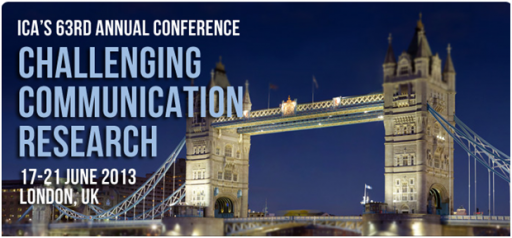ICA’s 63rd Annual Conference: Challenging Communication Research
April 25, 2013
 ICA’s 63rd Annual Conference will be held from 17-21 June 2013 at the Hilton London Metropole, London, UK. Conference Registration is now open.
ICA’s 63rd Annual Conference will be held from 17-21 June 2013 at the Hilton London Metropole, London, UK. Conference Registration is now open.
The annual conference is a rare gathering of a large number of ICA members in the same location. But given the number of attendees and how they scatter in so many different sessions, it is important to make sure that the conference is punctuated by opportunities for all participants to share a moment together.
This year’s conference will, once again, provide many such opportunities. There will be the traditional opening reception on Monday night, Cynthia Stohl’s Presidential Address right after the ICA Annual Awards on Wednesday afternoon, and the interactive paper/poster session on Thursday afternoon. And there will be a number of thematic plenary and miniplenary sessions.
The opening plenary session will take place on Monday evening. The theme will be “Born Challenging: The Mark of Cultural Studies on Communication Research” featuring Dick Hebdige (U of California – Santa Barbara), David Morley (U of London, Goldsmiths), and Jackie Stacey (U of Manchester) and chaired by Liesbet Van Zoonen (Loughborough U). Cultural Studies have developed by challenging the existing ways of conceiving, conducting, and reporting research. To challenge is often to meet scepticism or even resistance. To challenge is always to prompt debate and foster creativity. Cultural Studies have grown into a body of research that sheds new light on objects typically investigated in media and communication science. This panel featuring prominent figures of contemporary Cultural Studies will discuss the mark of cultural studies in communication research.
A second plenary, scheduled Tuesday at noon, is on “The Network Tradition in Communication Research and Scholarship” featuring Noshir Contractor (Northwestern U), Elihu Katz (Annenberg Penn & Hebrew U), Ronald E. Rice (U of California – Santa Barbara), and Richard A. Rogers (U of Amsterdam) and chaired by Leah A. Lievrouw (U of California – Los Angeles, ICA 2013 Theme Chair). The proliferation of new media and information technologies over the last 30 years has captured the interest and imagination of communication scholars across the discipline, helping to move the concept of “network” to the forefront of theorizing and empirical study in diverse corners of the field. This session considers the long-term intellectual influence of network thought, theory, and methods in the communication discipline.
On Wednesday, at 12:30, delegates will have to choose among three miniplenaries. Two of these are ICA Fellows Panels featuring ICA Fellows Sandra L. Calvert (Georgetown U) , John Hartley (Curtlin U) and Steven Jones (U of Illinois, Chicago) for the first panel; Don Ellis (U of Hartford), Janet Fulk (U of Southern California) and Dennis K. Mumby (U of North Carolina) for the second panel.
A third miniplenary will be dedicated to “Challenges in Media and Communication Regulation”, featuring Colette Bowe (Chair of OFCOM), Sascha Meinrath (New America Foundation), Rod Tiffen (U of Sydney) and chaired by Peter Lunt(U of Leicester). The pace of evolution of media and communication technologies and its uses outruns that of legislation and regulatory mechanisms. Freedom of expression and free flows of communication collide with privacy, intellectual property, and accountability. This panel will discuss the challenges of media and communication regulation in the face of a fast-changing communication ecosystem.
Finally, the longest conference in ICA’s history will end on a closing plenary themed “The Bridge and the Barrier: The Challenges of Language Use in Communication Research” featuring Dafna Lemish (Southern Illinois U, Chair of ICA’s Internationalization Task Force), Toby Miller (City U, London), and Michael Oustinoff (U of Paris 3 and Institut des Sciences de la Communication du CNRS – ISCC) and chaired by myself. The hegemony of English in international research and publication is perceived by many as a barrier excluding scholars from many regions of the world. In spite of a consensus on the need for action to overcome the language barrier, initiatives seem to have very limited results. This panel will explore innovative ways to understand the causes and implications of these issues and to initiate new dynamics in internationalizing communication research in a way that benefits scholars and scholarship on both sides of the language barrier.
We are looking forward to seeing many of you at these exciting sessions that will, like the rest of the program, make this year’s conference unique and, we hope, unforgettable.